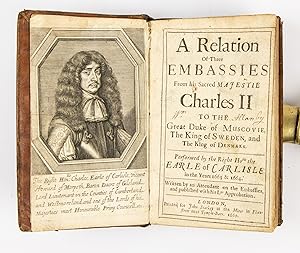About this Item
Bound in contemporary polished calf, rebacked preserving original spine, corners bumped, light wear. Complete with the two engraved portraits of Charles Howard, First Earl of Carlisle (1628 1685) and Tzar Aleksey Mikhaylovich (1629-1676), just shaved at fore-edge. Title a little dusty, clean tear to margin of Z1 (not entering the text). Fine. First edition of this eyewitness account of the official English embassy to Russia, written by Guy Miege, under-secretary to the English ambassador Charles Howard,Earl of Carlisle. The book provides a fascinating window on the intricacies of Russian diplomatic protocols, ceremonial customs, and the hospitality bestowed upon high-ranking foreign dignitaries at the Russian court. "Carlisle's main responsibilities were to reciprocate the honor that Tzar Aleksey Mikhaylovich had shown to King Charles II in sending his diplomats to London, as well as to build the promising momentum in their relationship by negotiating the trade privileges that the English hoped to restore. It can safely be concluded that Carlisle's diplomatic mission resulted in a great failure. Ceremonial disputes and diverging economic interests precipitated a decline in Anglo-Russian relations and left the two monarchies in a state of mutual resentment."(Hennings) Guy Miegeobtained appointment as under-secretary toCharles Howard,Earl of Carlisle, in his embassy to Muscovy, Sweden, and Denmark, and in July 1663 joined an entourage that includedAndrew Marvellas chief secretary. WithCarlisle'sexpress permission,Miegewrote an account of the journey, subsequently published as'A Relation of Three Embassies'(1669), which is both an attempted vindication of the ambassador's conduct in the face of Russian criticism and a lively source of impressions of Russian society and culture. He considered Muscovy a beautiful country, but found its inhabitants, in contrast to the Swedes, coarse, austere, and ignorant of learning. Exhibiting a characteristic commitment to Protestantism and to constitutional monarchy, he was not impressed by a religion 'that obliges its Professors to severe mortification' or by icons, 'very ill-drawn, and in flat painting', and dismissed a monarchy that was 'despotical and absolute' [But like most 17th c. Englishmen, Miege respected Russian military prowess]." (ODNB) For a detailed account and analysis of the embassy and its repercussions, see Hennings, "Russia and Courtly Europe", p. 139-159. For another discussion, see Dukes, Herd and Kotilaine, "Stuarts and Romanovs", p. 105-113. FIRST ENGLISH EDITION (A French-language version appeared at Amsterdam in the same year.). Seller Inventory # 3916
Contact seller
Report this item
![]()



